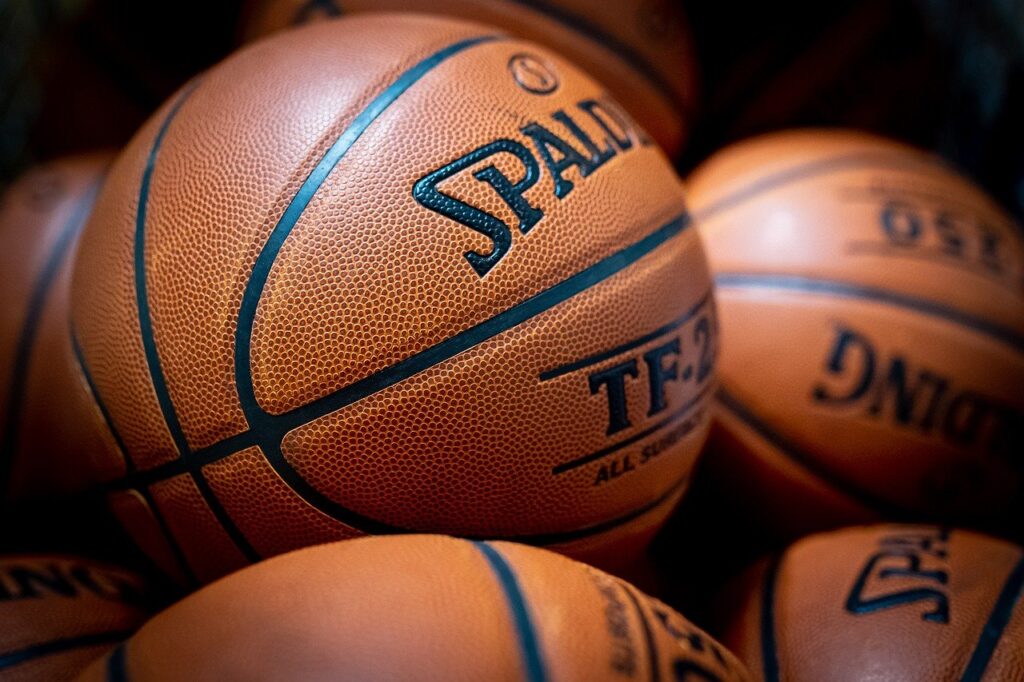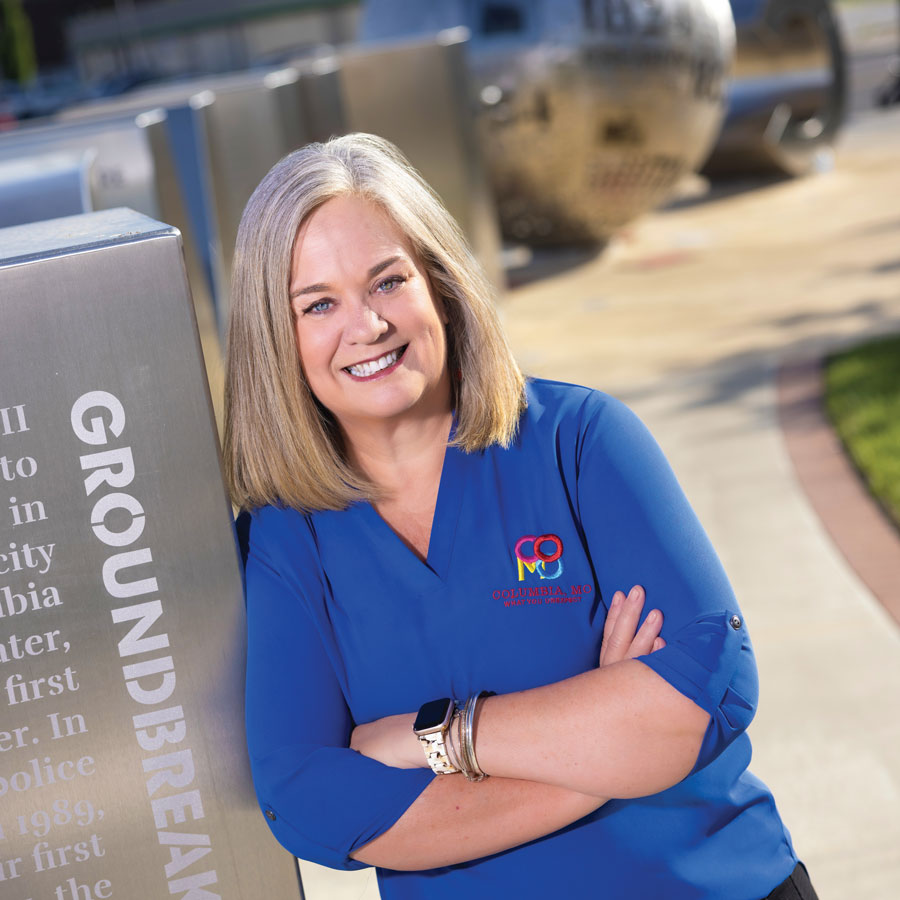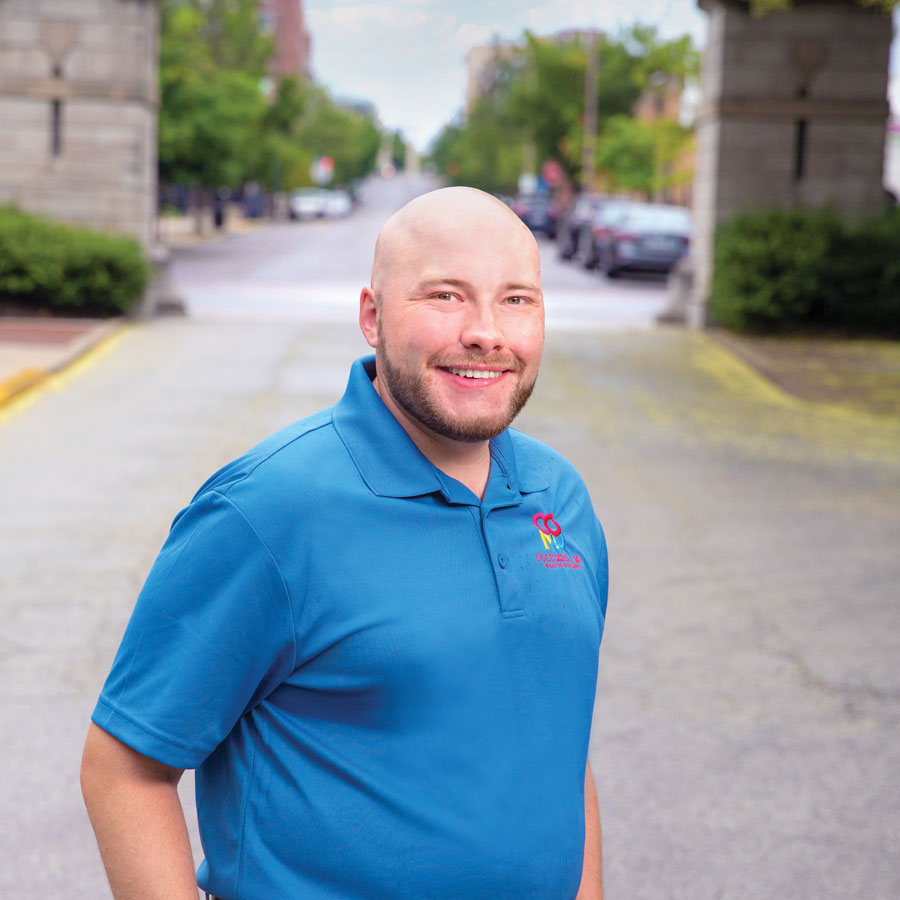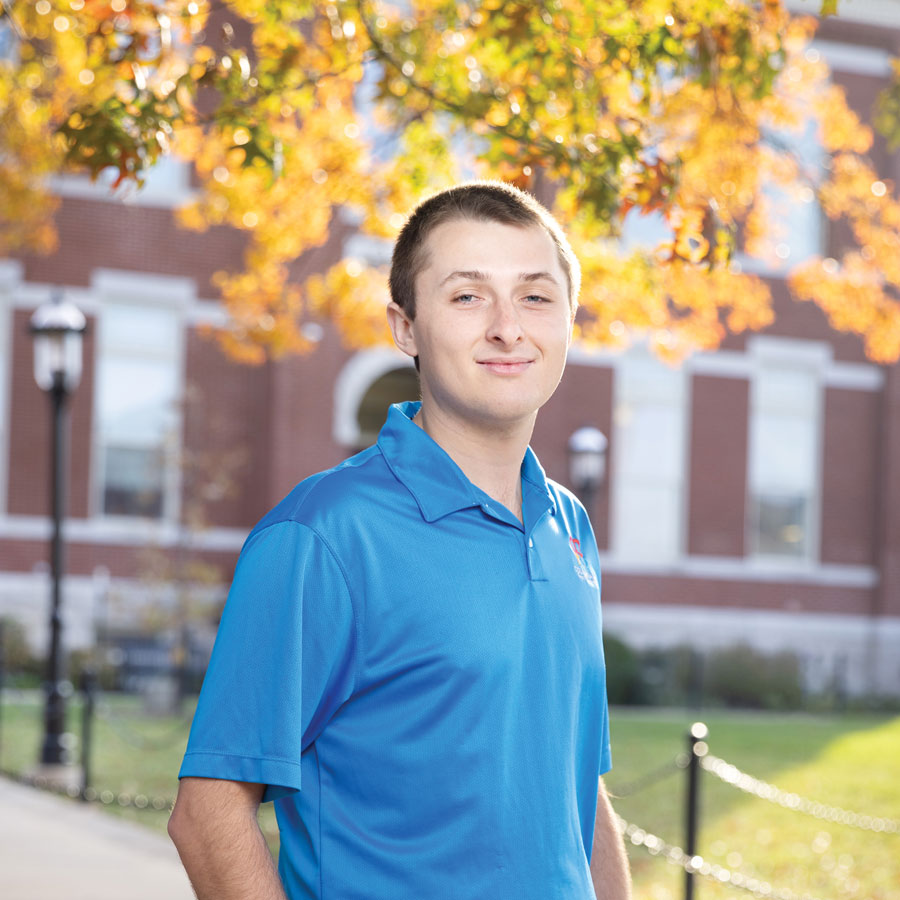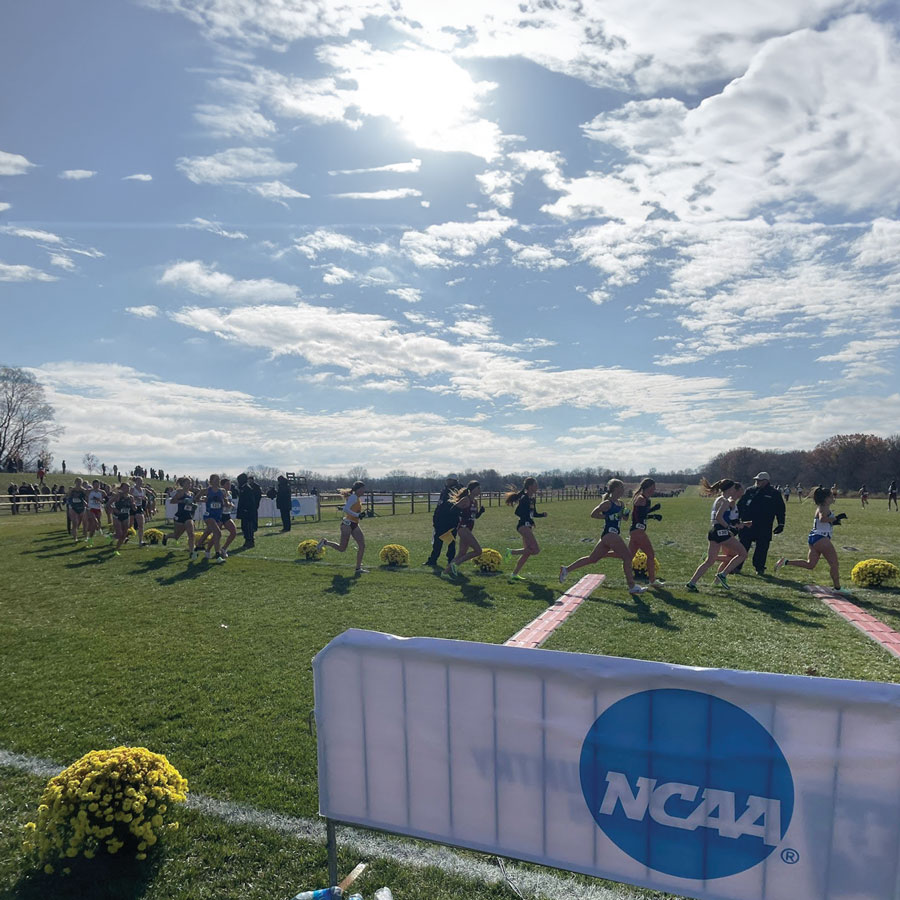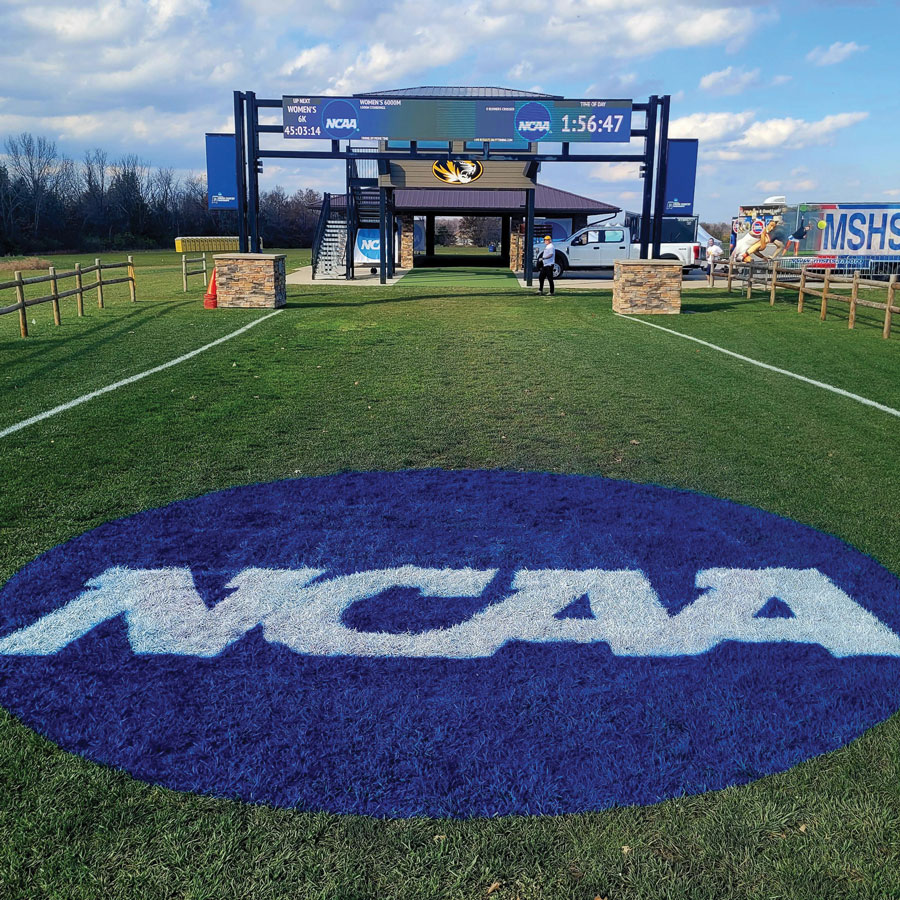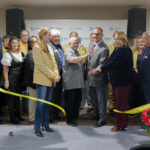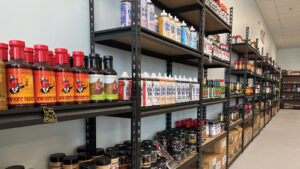Sports tourism is serious business for Columbia. The Sports Commission and Convention and Visitors Bureau aren’t playing around.
Sports tourism is big business. In the United States in 2023, it contributed more than $50 billion to the economy, according to Future Market Insights, Inc. By 2033, that number is expected to exceed $185 billion. Communities that want to grab a payoff for playoffs need to be prepared for battle.
In October 2022, COMO Magazine produced a story about the Columbia Sports Commission and the Convention and Visitors Bureau. The COVID-19 pandemic had disrupted normality for two years, throwing off multi-year contracts, particularly with event sponsors like the Missouri State High School Activities Association. In 2017, Columbia, which had hosted MSHSAA’s Show-Me Showdown for years, lost out on the lucrative five-year contract to Springfield, Missouri. You might say that the southwest Missouri city brought a slightly better A game to their hosting bid. And because of the pandemic, it was extended to a sixth year.
The Columbia Sports Commission is certainly a good sport, but it’s not one that accepts defeat lightly. In 2023, the city came roaring back, reclaiming the contract that brought the basketball tournament back from 2024 through 2028. Bolstered by great venues, ample hotel space, energetic local volunteers, and promises made by individuals and businesses to pledge sponsorship dollars, the Sports Commission made an offer MSHSAA couldn’t refuse.
It’s one of many stellar sporting events that bring thousands of people and millions of dollars to the city every year. The competition is always fierce. But by all accounts, Columbia is in the game. But the Sports Commission and CVB aren’t playing games. This is serious business.
It’s a Numbers Game
Two. That’s how many staff at the Convention and Visitors Bureau are dedicated to sports tourism. The entire operation is lean, with only a staff of twelve, led by Amy Schneider, director.
Adam Ziervogel is sports development supervisor and Trevor Bradley is sports events coordinator. CVB staff rely on the advice and guidance of the eleven-member volunteer Columbia Sports Commission. The CVB director, CVB Advisory Board chair, and Parks and Recreation director also have seats at the table.
Pulling sports events to the city isn’t the only job of anyone involved. Still, the economic impact of what they do is expected to be more than $8.9 million in the 2024 calendar year. For 2025, it’s estimated to surpass that by an additional $325,000.
The entire CVB is funded solely by the 5 percent lodging tax paid by the customers who stay at Columbia’s 33 hotels. That means visitors — not local residents — pay for efforts to attract sports and other events to the city.
Todd Guess, city business services manager, says the tax generated more than $4 million in fiscal year 2023, which ran from October 1, 2022, through September 30, 2023. Of course, hotels are filled with other events than just sports, such as college and university graduations and Mizzou home games. Occupancy is also raised by conventions and conferences that the CVB attracts. But the Sports Commission activities alone draw more than twice the CVB budget.
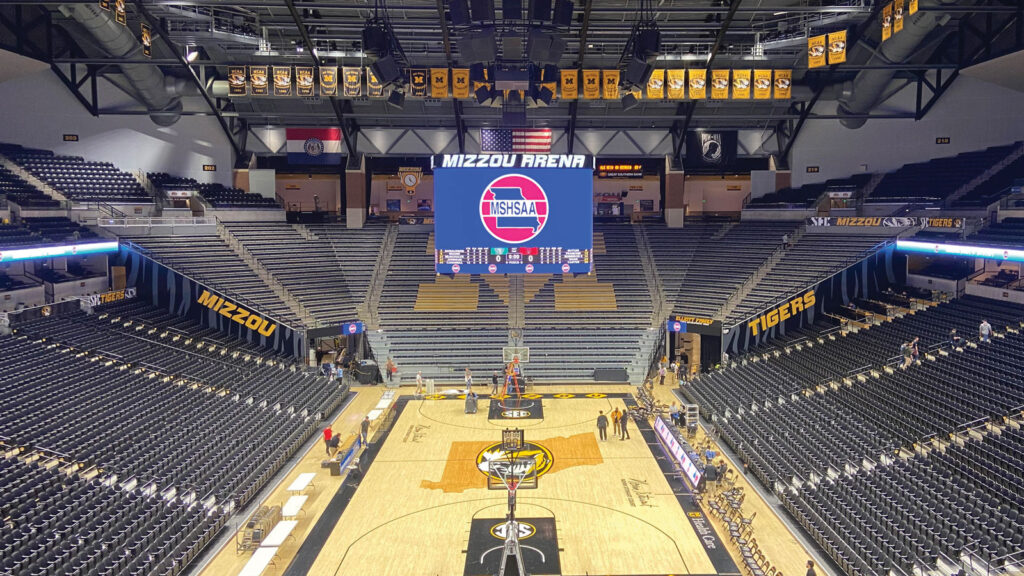
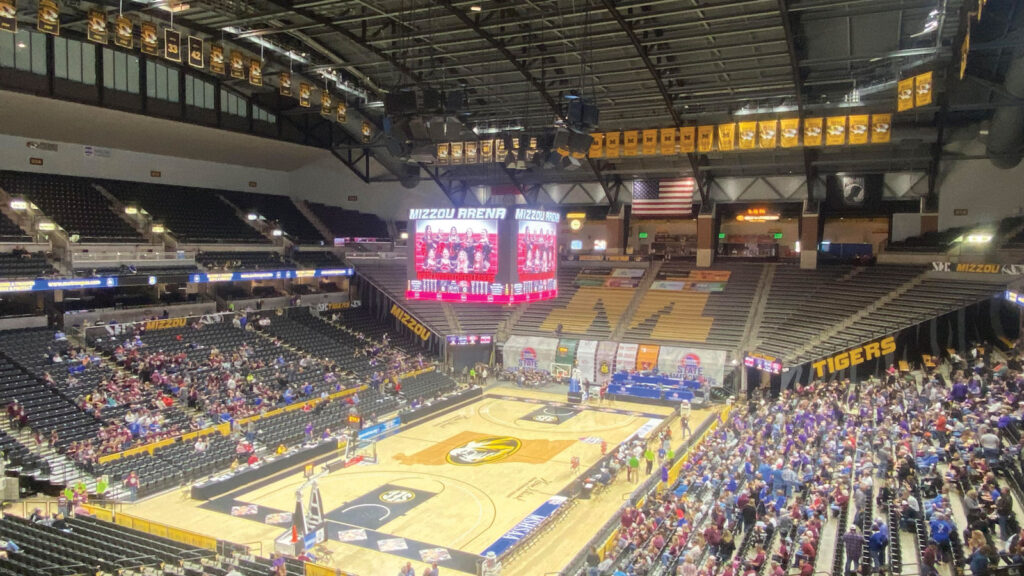
Hotels Are the Focus
“One hundred percent of anything you see in this building comes from the lodging tax,” says Schneider. “That’s our salaries, our administrative costs, any of our tourism development, our sales, our communications, our marketing. It all depends on the lodging tax. That’s why we see the hotels as our number one stakeholder. And that’s why we make sure that the money we put out, our return on investment, is bringing people into town and staying in our hotels.”
Keeping the occupancy rates up in Columbia hotels is no easy task. There are currently roughly 3,500 hotel beds in COMO.
Jared Klarfeld is regional director of sales for Chesterfield Hotels, Inc., and a member of the Sports Commission. Among its portfolio, Chesterfield Hotels owns and operates Hampton Inn & Suites — Columbia (at The University of Missouri), Stadium Grill, and The Broadway Columbia — a DoubleTree by Hilton. The Broadway is currently undertaking a $33.8 million expansion, building a new tower at its downtown location. That’s not chump change. The hotel is counting on keeping filled the 194 guest rooms it will have after the expansion. And the CVB’s track record with bringing sporting events to town has played an important role in that investment.
“There were certainly many factors that went into the decision to expand the property,” Klarfeld says about The Broadway project. “The overall demand for guest rooms and event space in Columbia, in part due to the work of the Sports Commission and the CVB, was no small part in that decision.”
The Value of Great Partners
Hotels are banking on the success of the Commission and the CVB. However, their success is also dependent on what local partners bring to the table. After all, the CVB doesn’t own sports venues and doesn’t pay organizers to hold their events here. For that, they rely on the strength of community. Without them, you might say the CVB can’t play ball.
Columbia is fortunate to boast some of the best athletic facilities anywhere. Those located at Mizzou and Columbia College are designed to meet the demands of the NCAA and NAIA. Moreover, these collegiate organizations won’t hold major events in cities that lack the presence of a member institution, which gives Columbia another advantage.
Columbia Parks and Recreation is a vital partner in many of the events the CVB brings to town. Gans Creek Recreation Area is arguably one of the best cross-country courses in the country. The NCAA national championships there will generate an estimated $2.3 million in 2025.
“A lot of cross-country courses are on golf courses or large mass-area parks,” says Ziervogel. “We’re really fortunate here to have a dedicated cross-country course that rivals the top courses in the country. We compete against that handful for NCAA and NAIA national championships.”
The new Columbia Sports Fieldhouse is a multi-use indoor complex for basketball, pickleball, volleyball, and archery. Now featuring four courts, there are plans to double the number of courts by late spring or early summer 2025. That size will be yet another weapon in Columbia’s arsenal when competing for circuit sporting events.
The championship-level disc golf course at Harmony Bends in Strawn Park is another magnet. The park hosts the Columbia Disc Golf Club, but also the Mid-America Open Disc Golf Tournament.
To illustrate how vital it is to have partners with top-notch facilities, look no further than MSHSAA’s 11-man state football championships. Columbia has been hosting this event since 2018. But the 2024 games this fall will be the last for a while because Mizzou is renovating the venue.
“That shows you why facility partners are so important,” says Schneider. “Mizzou literally cannot bid on them after this year because they’re doing renovations to Faurot Field. That’s a no-go. Once the renovations are done and Mizzou’s comfortable, we may be able to bid on them again.”
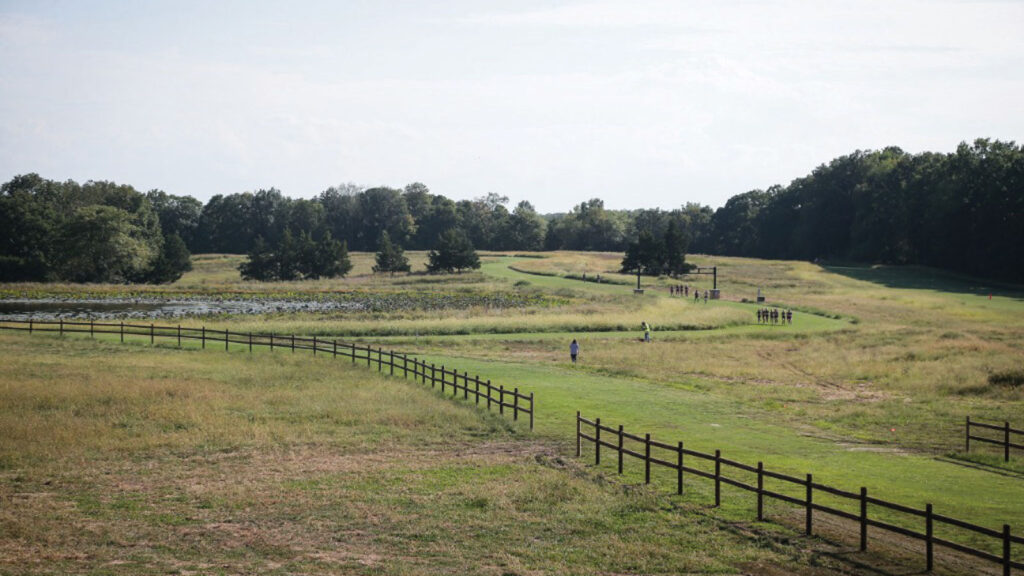
Sweetening the Pot
In addition to all the local business and private financial support, partner venues and facilities, volunteer availability, and consistent delivery of promises made to event organizers, the CVB has one other secret weapon. It’s the Sports Development Fund.
Of the 5 percent CVB funding, 1 percent is placed in the Tourism Development Fund. The SDF grants come from there and are awarded to organizers who apply for funding to help them with a range of activities the organizer will have to pay to host an event, such as venue rental, insurance, and event staff.
“The SDF was created to help us remain competitive in the sports tourism industry,” Ziervogel says. “With the growing costs of owning and operating events, it gives us a designated way to outline how we can recruit and continue supporting sports tourism-related events in Columbia that drive room-night generation. It additionally gives us a clearer way to support the bid fees that accompany events. It also helps us set limitations and better regulate our funding.”
It’s a Game Changer
The work of the Sports Commission and CVB continues to keep Columbia on the sports tourism map. The result is a boon to not only local hotels, but to hundreds of other businesses as well. Plus, residents are excited by the life sports inject into the city.
“People in the community take great pride in having these events,” says the CVB’s Bradley. “Everyone is excited by having MSHSAA basketball back. You can tell from the team of community volunteers who turn out for that event.”
“Bringing in sports events is an economic generator,” Schneider says. “It’s bringing new money into the community through not only the lodging tax but in sales tax. Adding sales tax dollars help Columbia continue to grow and improve.”
Sport tourism is good for residents, for businesses, for organizational sponsors and for local venues they pay to use. Don’t forget the athletes, coaches, family, and friends who travel here to compete. And whatever you do, don’t ever count out Columbia. This town is a fierce competitor in its own right.
